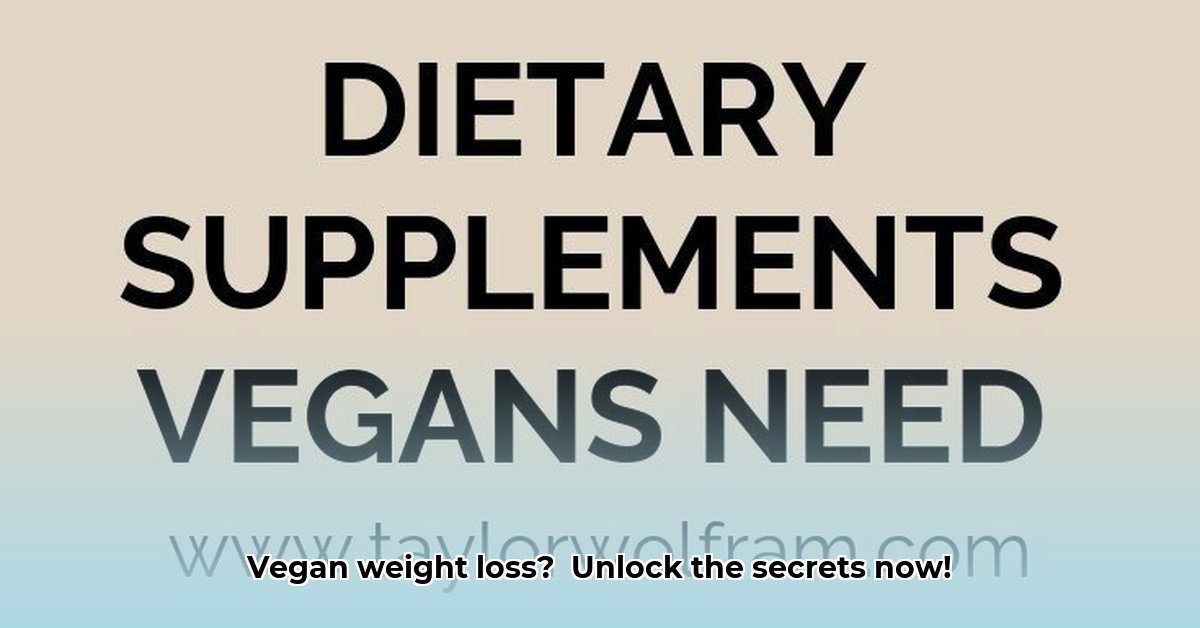
Understanding Vegan Weight Loss and the Role of Supplements
Embarking on a vegan weight loss journey? It's achievable, but understanding the role of supplements is key. A plant-based diet, naturally rich in fiber and low in unhealthy fats, often promotes satiety (feeling full) and aids weight management. However, nutritional deficiencies can arise. Vegan supplements can help fill these gaps, but they are not a replacement for a balanced diet and regular exercise. Think of them as supportive tools, not magic bullets. Some individuals might benefit from supplementation to ensure adequate intake of essential nutrients; others may not need them. It all depends on individual dietary planning and nutritional needs.
Exploring Different Types of Vegan Weight Loss Supplements
Several vegan supplements cater to different weight management aspects:
Protein Powders: Derived from peas, brown rice, soy, or blends, these provide essential amino acids crucial for muscle building and repair, promoting satiety and supporting overall bodily functions. They are helpful for those struggling to meet daily protein requirements through diet alone. Is it crucial for vegans to use protein powder for weight loss? It depends on individual needs and dietary planning.
Fiber Supplements: Sources like psyllium husk, chia seeds, and flaxseeds aid digestion and increase feelings of fullness. Increased fiber intake can regulate bowel movements and naturally curb appetite. Can fiber supplements alone lead to significant weight loss? Research suggests fiber is beneficial for weight management, but it’s most effective as part of a balanced diet and lifestyle.
Appetite Suppressants: These aim to reduce cravings and food intake. However, extreme caution is advised, and they should only be used under strict medical supervision. Their long-term effects and potential interactions with other medications require thorough evaluation by a healthcare professional.
Making Smart Choices: Selecting Safe and Effective Supplements
Choosing supplements wisely involves these steps:
Decipher the Labels: Scrutinize the ingredient list, serving sizes, and added substances (sugars, artificial ingredients). Opt for supplements with clear ingredient sourcing and minimal processing.
Consult Your Doctor or Registered Dietitian: This is paramount! A healthcare professional will assess your individual needs, considering pre-existing conditions and medications, and guide you toward safe and appropriate dosages.
Start Low and Go Slow: Begin with lower than recommended doses to monitor your body’s response and minimize potential side effects.
Prioritize Whole Foods: Supplements support, but do not replace, a balanced diet. Focus on diverse, whole plant-based foods: fruits, vegetables, legumes, whole grains, nuts, and seeds.
Potential Downsides: Risks and Side Effects
While generally safe, some supplements can cause digestive upset, allergies, or interact negatively with medications. Appetite suppressants pose a higher risk of side effects due to their impact on the body. Professional guidance is essential to mitigate risks.
Integrating Supplements into Your Healthy Vegan Lifestyle
Weight loss hinges on a holistic approach:
Balanced Nutrition: Prioritize a diverse diet, embracing various fruits, vegetables, legumes, and whole grains.
Regular Exercise: Incorporate enjoyable physical activity into your routine—even moderate activity offers significant benefits.
Mindful Eating: Pay attention to hunger and fullness cues; avoid distractions during meals.
Weighing the Pros and Cons: A Quick Overview
| Feature | Pros | Cons |
|---|---|---|
| Protein Powders | Convenient protein boost, aids muscle building, enhances satiety | Potential digestive issues, may contain additives or added sugars |
| Fiber Supplements | Improved digestion, increased fullness, aids weight management | Possible bloating or gas, especially if started at high doses |
| Appetite Suppressants | May help reduce cravings and overall calorie intake | Potential for side effects, possible dependence, may interact with medications |
Remember, supplements are tools, not solutions. A balanced diet and regular exercise are fundamental for long-term, sustainable weight management. Always seek professional guidance before starting any supplement regimen.